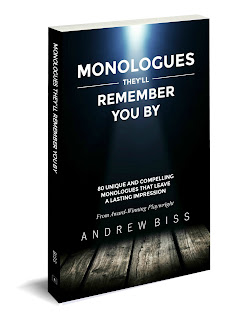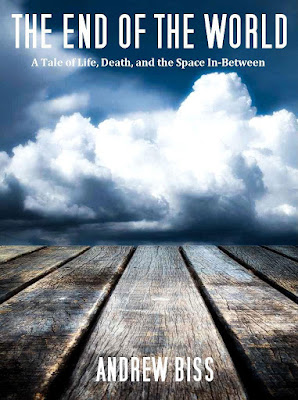It's Out! 'Monologues They'll Remember You By' is Officially Released!
Yes, the day has finally arrived: ‘Monologues They’ll Remember You By’ is officially released!
It’s been a long journey, I have to say: The search to compile the best monologues within my body of work; the task of selecting what to include and what to omit; creating introductions to each piece, defining the setting, tone and character; and writing the introduction to the book itself, along with other supporting materials. But it was all worth it in the end, and I’m proud and confident to put this book before the buying public, safe in the knowledge that what I’m offering is a truly valuable and unique resource for any actor.
One of the things that really sets this book apart is that not only does it contain a large array of monologues you won’t find anywhere else, it also provides a guide on how to approach your monologue search from an entirely new perspective.
Though the monologues included are separated into male and female monologues (40 male, 40 female) of varying age ranges, the book explains how to look beyond the gender and age of many of them and make them work for you, whether or not your age or gender matches the original character as written.
Too often, monologue books are rigidly defined by both of those factors. They will, for instance, present a monologue by a character named “John” who is in his early 20s – and that’s it, that’s who it’s for: a young male in his early 20s. But the fact of the matter is, if nothing in the text of the monologue defines the character as male or young, what on earth should stop a woman in her 40s from performing it? Change the name to “Jane” and what’s the difference?
As I point out in the book, casting directors are not looking for strict adherence to the original character’s ethnicity, age or gender. All they want to see is you walk onto that stage and bowl them over with a performance that shows them you have what they’re looking for. Period.
Obviously this doesn’t work with every monologue, as some do contain age or gender related information. But even then, I encourage the reader to look beyond that where possible and make slight alterations to the text to adapt it to fit their needs where practicable.
In approaching the book in this way, I’m enabling the actor to open up a whole range of alternative performance options that at first glance might not have appeared possible.
So there it is – it’s finally out there and I couldn’t be happier with it. But my biggest reward will be in knowing these monologues will have helped actors get the parts that they’d set their hearts on. As a former actor myself and knowing how that feels, I can imagine nothing more gratifying.
If you're interested in finding out more, you can take a look at 'Monologues They'll Remember You By' on Amazon, as well as on its dedicated website.
It’s been a long journey, I have to say: The search to compile the best monologues within my body of work; the task of selecting what to include and what to omit; creating introductions to each piece, defining the setting, tone and character; and writing the introduction to the book itself, along with other supporting materials. But it was all worth it in the end, and I’m proud and confident to put this book before the buying public, safe in the knowledge that what I’m offering is a truly valuable and unique resource for any actor.
One of the things that really sets this book apart is that not only does it contain a large array of monologues you won’t find anywhere else, it also provides a guide on how to approach your monologue search from an entirely new perspective.
Though the monologues included are separated into male and female monologues (40 male, 40 female) of varying age ranges, the book explains how to look beyond the gender and age of many of them and make them work for you, whether or not your age or gender matches the original character as written.
Too often, monologue books are rigidly defined by both of those factors. They will, for instance, present a monologue by a character named “John” who is in his early 20s – and that’s it, that’s who it’s for: a young male in his early 20s. But the fact of the matter is, if nothing in the text of the monologue defines the character as male or young, what on earth should stop a woman in her 40s from performing it? Change the name to “Jane” and what’s the difference?
As I point out in the book, casting directors are not looking for strict adherence to the original character’s ethnicity, age or gender. All they want to see is you walk onto that stage and bowl them over with a performance that shows them you have what they’re looking for. Period.
Obviously this doesn’t work with every monologue, as some do contain age or gender related information. But even then, I encourage the reader to look beyond that where possible and make slight alterations to the text to adapt it to fit their needs where practicable.
In approaching the book in this way, I’m enabling the actor to open up a whole range of alternative performance options that at first glance might not have appeared possible.
So there it is – it’s finally out there and I couldn’t be happier with it. But my biggest reward will be in knowing these monologues will have helped actors get the parts that they’d set their hearts on. As a former actor myself and knowing how that feels, I can imagine nothing more gratifying.
If you're interested in finding out more, you can take a look at 'Monologues They'll Remember You By' on Amazon, as well as on its dedicated website.




Comments
Post a Comment